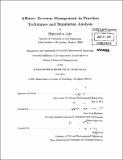Alliance revenue management in practice : techniques and simulation analysis
Author(s)
Jain, Himanshu, S.M. Massachusetts Institute of Technology
DownloadFull printable version (15.79Mb)
Other Contributors
Massachusetts Institute of Technology. Dept. of Civil and Environmental Engineering.
Advisor
Peter Paul Belobaba.
Terms of use
Metadata
Show full item recordAbstract
The primary motivations for the formation of airline alliances have been to increase revenues and decrease costs for alliance partners. A major advantage comes through increase in the number of destinations served by an airline at little costs, by using codesharing. Airlines share seat inventory on each other's codeshare flights which complicates their revenue management practice and leads to sub optimal revenue gains. This thesis analyzes the challenges related to alliance revenue management in practice and proposes innovative and feasible solutions to increase revenues for the combined alliance. The four key dimensions of the alliance revenue management problem are analyzed: recording & forecasting, seat allocation method or optimizer, codeshare valuation in the optimizer and availability control of codeshare bookings. The performance of different techniques is quantified using the Passenger Origin-Destination Simulator (PODS). It is found that sharing of information between partners to different degrees can be used to improve revenues. A new valuation scheme called dynamic valuation is developed in an effort to increase the combined alliance revenues by using bid price sharing, a method of sharing information related to codeshare legs. Dynamic valuation leads to additional revenue gains in the range of 0.30% to 0.50% over other techniques. This can translate into an incremental revenue gain, up to $ 100 M per year, for larger airlines in alliance partnerships. Dynamic valuation also provides a basis for further development of models related to revenue sharing proportions of alliance partners. The challenges and risks involved in implementing dynamic valuation are discussed.
Description
Thesis (S.M. in Transportation)--Massachusetts Institute of Technology, Dept. of Civil and Environmental Engineering, 2011. Cataloged from PDF version of thesis. Includes bibliographical references (p. 139-142).
Date issued
2011Department
Massachusetts Institute of Technology. Department of Civil and Environmental EngineeringPublisher
Massachusetts Institute of Technology
Keywords
Civil and Environmental Engineering.